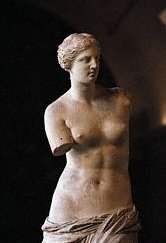APHRODITE: THE MYTH
Aphrodite is the goddess of love and beauty, identified in Rome with the
ancient italic divinity Venus. She was also the goddess of universal life and fertility.
The name of the goddess can have had its origin from an ancient Virgin, whose
characteristic was her independence. The Virgin’s name was "Frei" (which
means "free") in the German culture and the day dedicated to the goddess has
become "Freitag". From here "Friday", the correspondent day in
English, has had its origin.
There are two different traditions concerning her birth: one assumes she is the daughter
of Zeus and Dione (ancient pelagic divinity); the other tradition refers to her as the
daughter of Uranus, whose sexual organs, cut off by Chronos, fell into the sea and
generated the goddess, the " Lady born from the waves "or" born from the
sperm of Uranus ".
As she came out from the sea, Aphrodite was taken first to Citera, then to the coast of
Cyprus by the Zephyrs. There she was received by the Seasons/Hours, she was dressed and
adorned and taken to the Immortals.
A legend by Lucianus tells that she was first brought up by Nereus. Later, Plato imagined
the existence of two Aphrodites: the one born from Uranus (the sky), Aphrodite Urania,
goddess of pure love, and the daughter of Dione, Aphrodite Pandemia, goddess of vulgar
love. This is a late philosophic interpretation, not connected with the most ancient myths
about the goddess.
Regarding Aphrodite, several legends were written, but they don’t form a consistent
" corpus ", they are several episodes where the goddess intervenes.
Aphrodite was the wife of Hephaestus, the lame god of Lemno, but she loved Ares, the
warrior god. Homer wrote how the two lovers were discovered, in the morning, by the Sun,
who referred the fact to Hephaestus. The god prepared secretly a trap: it was a magic net
which he alone could control. One night, while the two lovers were on Aphrodite’ s
bed, Hephaestus hauled the net and caught them, then he summoned all the gods and
goddesses of Olympus. Begged by Poseidon, he drew back the net and the ashamed Aphrodite
ran away to Cyprus, Ares to Thrace. From their love affair Eros and Anteros, Deimus and
Phobus (Terror and Fear) and Harmonia were born. Also Priapos, patron of the gardens, is
said to be one of their sons because Aphrodite, especially in her italic incarnation
Venus, is also considered the goddess of the gardens. Aphrodite also loved Adonis, son of
Myrra, killed from jealousy by Ares, Anchises, from whom she had Aeneas and Hermes, from
whom he had Hermaphroditus.
Aphrodite’ s anger and curses were famous: for example she punished the women of
Lemno, as they didn’t adore her, making them smell terribly, so that their men left
them for Thacian prisoners. Her favour was not less dangerous: in order to win the golden
apple, prize for the most beautiful goddess, she promised Paris the most beautiful woman
of the world, Helen, wife of Menelaus, and in this way she caused the war of Troy.
Aphrodite was the patroness of Rome because she had protected Aeneas, its founder, and his
son Julo during their flight from Troy
She was accompanied by the Graces, the Laugh, the Cupids, the Nymphs, the doves, sacred to
her, or by flights of sparrows. Also swans, hares, dolphins, tortoises were sacred to her.
Among plants she loved roses, myrtle, apple-trees and poppies.
|
 |
VENUS IN
LITERATURE :
ALEXANDER POPE
(London 1688-Twickenham 1744)
Son of a rich catholic merchant, he was forbidden to attend
public schools because of his religion. He studied privately so hard that he compromised
his already delicate health (he suffered from tuberculosis of the bones). He frequented
London high society and in 1718, after his successful version of Iliad, he moved to
a splendid villa in Twickenham. He continued his intense activity as literary man until
his death.
His most important works are: The Rape of the Lock (1714), Pastorals (1709),
Windsor forest (1713) and the translations of Iliad and Odyssey.
Alexander Pope
From: Eloisa to Abelard
257 Come, Abelard! for what hast thou to dread?
258 The torch of Venus burns not for the dead.
259 Nature stands check’d; Religion disapproves;
260 Ev’n thou art cold—yet Eloisa loves.
261 Ah hopeless, lasting flames! like those that burn
262 To light the dead, and warm th’unfruitful urn.
Alexander Pope
The rape of the lock: canto 5
133 This the beau monde shall from the Mall survey,
134 And hail with music its propitious ray.
135 This the blest lover shall for Venus take,
136 And send up vows from Rosamonda’s lake.
137 This Partridge soon shall view in cloudless skies,
138 When next he looks through Galileo’s eyes,
139 And hence th’egregious wizard shall foredoom
140 The fate of Louis, and the fall of Rome.
Alexander Pope
Summer: the second Pastoral, or Alexis
To Dr. Garth
…
59 See what delights in sylvan scenes appear!
60 Descending gods have found Elysium here.
61 In woods bright Venus with Adonis stray’d,
62 And chaste Diana haunts the forest shade.
63 Come, lovely nymph, and bless the silent hours,
64 When swains from shearing seek their nightly bow’rs;
65 When weary reapers quit the sultry field,
66 And crowned with corn their thanks to Ceres yield,
67 This harmless grove no lurking viper hides,
68 But in my breast the serpent Love abides.
69 Here bees from blossoms sip the rosy dew,
70 But your Alexis knows no sweets but you.
71 Oh deign to visit our foresaken seats,
72 The mossy fountains, and the green retreats!
73 Where’er you walk, cool gales shall fan the glade,
74 Trees, where you sit, shall crowd into a shade;
75 Where’er you tread, the blushing flow’rs shall rise,
76 And all things flourish where you turn your eyes.
77 Oh! how I long with you to pass my days,
78 Invoke the Muses, and resound your praise!
79 Your praise the birds shall chant in ev’ry grove,
80 And winds shall waft it to the pow’rs above,
81 But would you sing, and rival Orpheus’strain,
82 The wond’ring forests soon should dance again;
83 The moving mountains hear the pow’rful call,
84 And headlong streams hang list’ning in their fall!
The earlier part of the 18th century has been called the Augustan Age.
The period is also called neo-classical because several poets of the time looked
upon Virgil, Horace and Ovid, poets who lived in Rome during the Empire of Augustus, as
models. These poets attempted to reproduce the formal perfection of the classics and
therefore they observed strict rules of metre and rhyme. The language of their poems
removed from everyday language and was only appropriate for poetry. Poets like Pope saw
themselves as exponents of human reason, not of human emotion. In fact poetry was
considered intellectual rather than emotional
|
 |
VENUS IN
LITERATURE :
PERCY BYSSHE
SHELLEY
(Horsham 1792-Bay of La Spezia 1822)
He was born into a family of country gentry. He was sent to
Eton and then entered University College, Oxford, but was expelled in 1811 for publishing The
Necessity of Atheism, a pamphlet in which he asserted that God’s existence is not
provable. His already difficult relationship with his father worsened after his marriage
with Harriet Westbrook, a young girl of only 16. They lived a nomadic existence while
Shelley was active as a political radical. In 1813 he abandoned his wife and moved to
Switzerland with Mary Godwin, the daughter of the anarchist philosopher William Godwin,
whom he had met in 1812. He became friend to Byron and wrote The Revolt of Islam, a
long epic poem in which he preached bloodless revolution. Banned from English society
because of his radical ideas and his eccentricity, he left for Italy where he wrote most
of his best poetry. He drowned in a boating accident in the bay of La Spezia.
Adonais: an elegy on the death of
John Keats
Stanza I
1 I weep for Adonais—he is dead!
2 Oh, weep for Adonais! though our tears
3 Thaw not the frost which binds so dear a head!
4 And thou, sad Hour, selected from all years
5 To mourn our loss, rouse thy obscure compeers,
6 And teach them thine own sorrow, say: "With me
7 Died Adonais; till the Future dares
8 Forget the Past, his fate and fame shall be
9 An echo and a light unto eternity!"
……..
Stanza IV
28 Most musical of mourners, weep again!
29 Lament anew, Urania! He died,
30 Who was the Sire of an immortal strain,
31 Blind, old and lonely, when his country’s pride,
32 The priest, the slave and the liberticide,
33 Trampled and mock’d with many a loathed rite
34 Of lust and blood; he went, unterrified,
35 Into the gulf of death; but his clear Sprite
36 Yet reigns o’er earth; the third among the sons of light.
……..
Stanza XV
127 Lost Echo sits amid the voiceless
mountains,
128 And feeds her grief with his remember’d lay,
129 And will no more reply to winds or fountains,
130 Or amorous birds perch’d on the young green spray,
131 Or herdsman’s horn, or bell at closing day;
132 Since she can mimic not his lips, more dear
133 Than those for whose disdain she pin’d away
134 Into a shadow of all sounds: a drear
135 Murmur, between their songs, is all the woodmen hear.
…….
Stanza XVI
136 Grief made the young Spring wild, and she threw down
137 Her kindling buds, as if she Autumn were,
138 Or they dead leaves; since her delight is flown,
139 For whom should she have wak’d the sullen year?
140 To Phoebus was not Hyacinth so dear
141 Nor to himself Narcissus as to both
142 Thou, Adonais: wan they stand and sere
143 Amid the faint companions of their youth,
144 With dew all turn’d to tears; odour, to sighing ruth.
NOTES
Form: ababcdcdd
The title: Keats, with whom Shelley had been acquainted in
England, died in Rome on February 23, 1821, without taking advantage of Shelley'’
invitation to visit him. Shelley composed this elegy in spring and it was printed in July.
He called it "a highly wrought piece of art" and "the least imperfect of my
compositions".
1. The unusual form of Shelley’s title may derive from a combination
of the Greek forms Adonis and Adonai.
The myth: the beautiful young Adonis is slain by a boar and
mourned by his lover Venus; from her tears over his bleeding corpse spring out of the
ground red windflowers or anemones. Adonis is thought to revive and die annually like a
vegetation spirit.
29. Urania, the name here given to Venus, is that of Plato’s higher
Venus and of the classical Muse of astronomy.
127. Echo, in classical myth, was in love with Narcissus and wasted away
to a mere voice when her love was unrequited.
140-1. Hyacinth, beloved of Phoebus Apollo, was accidentally slain by
him with a discus; Narcissus pined away with love of his own reflection in the water. |
 |
![]()
![]()
![]()


